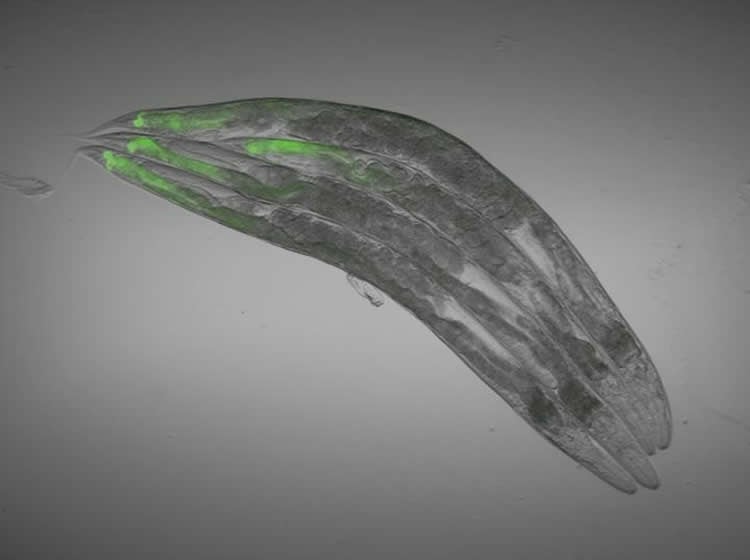Summary: Researchers report that manipulating dopamine signaling in the nervous system of C. elegans can control inflammation in the gut.
Source: Duke.
Drugs aimed at nervous system act on immune system as well.
There’s a reason it’s called a gut feeling. The brain and the gut are connected by intricate neural networks that signal hunger and satiety, love and fear, even safety and danger. These networks employ myriad chemical signals that include dopamine, a powerful neurotransmitter most famous for its role in reward and addiction.
Duke University researchers have shown that manipulating dopamine signaling in the nervous system of the nematode worm C. elegans can control inflammation in the gut.
The study, which appears Aug. 12 in Current Biology, provides a proof of principle that the immune system can be controlled using drugs originally designed to target the nervous system, such as antipsychotics.
“We are talking about an existing set of drugs and drug targets that could open up the spectrum of potential therapeutic applications by targeting pathways that fine-tune the inflammatory response,” said Alejandro Aballay, Ph.D., a professor of molecular genetics and microbiology at Duke School of Medicine.
“It is a big leap from worms to humans, but the idea of targeting the nervous system to control the immune system could potentially be used to treat conditions such as rheumatoid arthritis, autoimmune disease, cancer, inflammatory bowel disease, and Crohn’s disease,” Aballay said.
Recent research suggests that the wiring between the gut and the brain is involved in many other maladies, including autism, anxiety, depression, Alzheimer’s disease, and Parkinson’s disease.
Aballay believes that C. elegans provides an excellent model for dissecting this complex cross-talk between the nervous system and the immune system. This tiny, transparent worm has a simple nervous system, consisting of only 302 neurons compared to the roughly 100 billion neurons in the human brain. Yet the worm also has a very basic, rudimentary immune system.
Aballay and his team first stumbled upon the gut-brain connection a few years ago when they were studying the immune system of C. elegans. The worms were subjected to a barrage of chemicals in search of immune activators that could protect against bacterial infections. Out of more than a thousand different chemical compounds, they identified 45 that turned on an immune pathway. Curiously, half of those were involved in the nervous system, and a handful blocked the activity of dopamine.
In this study, Aballay decided to examine the effects of dopamine and dopamine signaling pathways on immunity.

Graduate student Xiou Cao blocked dopamine by treating animals with chlorpromazine, a dopamine antagonist drug used to treat schizophrenia and manic depression in humans. He found that these worms were more resistant to infection by the common pathogen Pseudomonas aeruginosa than counterparts that hadn’t received the drug.
When Cao then treated the animals with dopamine, it generated the opposite effect, rendering them more susceptible to infection.
The researchers believe their findings indicate that dopamine signaling acts by putting the brakes on the body’s inflammatory response so it doesn’t go too far.
“Worms have evolved mechanisms to deal with colonizing bacteria,” Aballay said. “That is true for us as well. Humans have trillions of microorganisms in our guts, and we have to be careful when activating antimicrobial defenses so that we mainly target potentially harmful microbes, without damaging our good bacteria — or even our own cells — in the process.”
“The nervous system appears to be the perfect system for integrating all these different physiological cues to keep the amount of damage in check,” Aballay said.
Aballay plans continue his studies in C. elegans to identify the different cues involved in fine-tuning the immune response. He also thinks it is worth looking at different analogues or different doses of dopamine antagonists to see if their effects on psychosis can be separated from their effects on immunity.
Funding: The research was supported by the National Institutes of Health (GM0709077 and AI117911).
Source: Robin Smith – Duke
Image Source: This NeuroscienceNews.com image is credited to Alejandro Aballay Lab, Duke University.
Original Research: Abstract for “Neural Inhibition of Dopaminergic Signaling Enhances Immunity in a Cell-Non-autonomous Manner” by Xiou Cao and Alejandro Aballay in Current Biology. Published online August 11 2016 doi:10.1016/j.cub.2016.06.036
[cbtabs][cbtab title=”MLA”]Duke. “Targeting the Gut-Brain Connection Can Impact Immunity.” NeuroscienceNews. NeuroscienceNews, 11 August 2016.
<https://neurosciencenews.com/immunity-gut-brain-connection-4829/>.[/cbtab][cbtab title=”APA”]Duke. (2016, August 11). Targeting the Gut-Brain Connection Can Impact Immunity. NeuroscienceNews. Retrieved August 11, 2016 from https://neurosciencenews.com/immunity-gut-brain-connection-4829/[/cbtab][cbtab title=”Chicago”]Duke. “Targeting the Gut-Brain Connection Can Impact Immunity.” https://neurosciencenews.com/immunity-gut-brain-connection-4829/ (accessed August 11, 2016).[/cbtab][/cbtabs]
Abstract
Neural Inhibition of Dopaminergic Signaling Enhances Immunity in a Cell-Non-autonomous Manner
Highlights
•Inhibition of dopamine signaling protects against bacterial infections
•Chlorpromazine enhances immunity by inhibiting a D1-like dopamine receptor
•Dopamine signaling regulates p38 MAP kinase activity
•Dopaminergic neurons control immunity in the C. elegans intestine
Summary
The innate immune system is the front line of host defense against microbial infections, but its rapid and uncontrolled activation elicits microbicidal mechanisms that have deleterious effects. Increasing evidence indicates that the metazoan nervous system, which responds to stimuli originating from both the internal and the external environment, functions as a modulatory apparatus that controls not only microbial killing pathways but also cellular homeostatic mechanisms. Here we report that dopamine signaling controls innate immune responses through a D1-like dopamine receptor, DOP-4, in Caenorhabditis elegans. Chlorpromazine inhibition of DOP-4 in the nervous system activates a microbicidal PMK-1/p38 mitogen-activated protein kinase signaling pathway that enhances host resistance against bacterial infections. The immune inhibitory function of dopamine originates in CEP neurons and requires active DOP-4 in downstream ASG neurons. Our findings indicate that dopamine signaling from the nervous system controls immunity in a cell-non-autonomous manner and identifies the dopaminergic system as a potential therapeutic target for not only infectious diseases but also a range of conditions that arise as a consequence of malfunctioning immune responses.
“Neural Inhibition of Dopaminergic Signaling Enhances Immunity in a Cell-Non-autonomous Manner” by Xiou Cao and Alejandro Aballay in Current Biology. Published online August 11 2016 doi:10.1016/j.cub.2016.06.036






